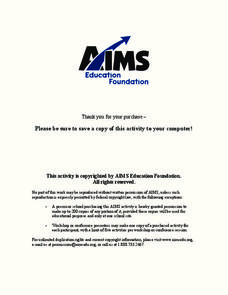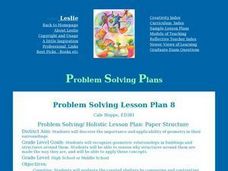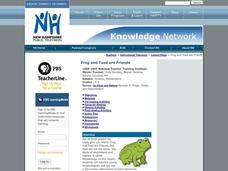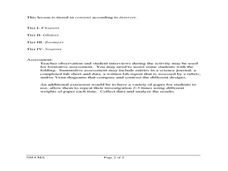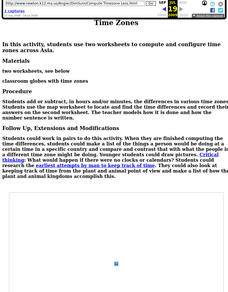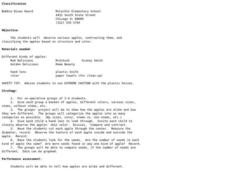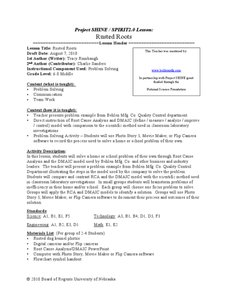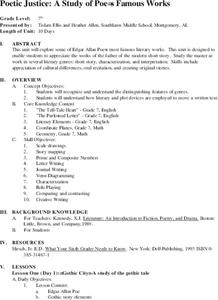Curated OER
Bears Wear Buttons
Students practice counting sets of objects and numerals. In this numerical identification lesson, students listen to the story, Bears Wears Buttons, and participate in a flash card activity where students must place buttons on a card...
Curated OER
Percents: What's the Use
Learners research percentages in real world situations. In this percents lesson, students demonstrate their ability to apply percents to everyday situations. Learners communicate mathematically by conducting interviews about percents and...
Curated OER
Problem Solving/ Holistic Lesson Plan: Paper Structure
Students observe geometric relationships in buildings and structures. They reason why structures are constructed in a specific way by applying geometric concepts. They construct a shelter using their geometric knowledge.
Curated OER
Edible Geometry
Students examine a chart that lists the main characteristics of polygons and 3 dimensional figures. They make examples of the polygons and figures using pretzels and gum drops showing how the gum drops are vertices and the pretzels are...
Curated OER
Mighty Oaks from Little Acorns
What does it mean to grow? To germinate? For the plan detailed here, class members investigate the growth process of an oak tree while focusing on the beginning stages of planting and germination. They plant seeds and record observations...
Curated OER
The Hudson's Ups and Downs
Fifth graders practice interpreting line graphs of the Hudson River water levels to assess the tides and tidal cycles in the estuary. They explore how weather can affect water levels and tides and observe that high tides and low tides...
Curated OER
Frog and Toad are Friends
Students view a 30-minute video lesson to discover information about the characteristics of frogs and toads. They then transform themselves into frogs and participate in a Jumping Frog Jubilee. They work in groups of three to measure and...
Curated OER
Origami Flight: The Physical Setting
Sixth graders investigate the forces that move certain objects. In this physics lesson, 6th graders design and create paper flying objects using origami methods, which they practice flying in different conditions. Students record and...
Curated OER
Time Zones
Fifth graders locate different time zones. In this time zones lesson, 5th graders label the different time zones. Students research the different ways man has kept time throughout history. Students also compute the differences in time...
Curated OER
Angles
Students measure angles using a protractor. In this geometry lesson, students solve for the missing angles using equations set to the theorem of triangles. They measure missing angles through construction and identify congruent angles.
Curated OER
Mass Measurement
Middle schoolers explore geometry by completing a physics activity on-line. In this mass measurement lesson, pupils define the terms mass, volume, and density and identify their relationship with each other. They complete an on-line...
Curated OER
Troublesome Towers
Students observe solids and identify parts that make up the surface area. For this geometry lesson, students calculate the surface are of solids and cones. They find polygons and solids in the real world.
Curated OER
Lines and Strings
In this lines and strings learning exercise, learners connect the letters along the outside of the box with string to create different kinds of lines. Students complete 4 problems.
Curated OER
The Shortest Line Mystery
Students calculate the shortest distance of various scenarios. For this algebra lesson, students interpret graphs of optimization problems. They use a graphing calculator to assist them in graphing and making predictions.
Curated OER
Million Dollar Project
Each student is given the task of spending $1 million. The way students spend their money is dependent on a theme such as "creating a dream world," "taking a trip," or "doing something to better society." Each student researches,...
Curated OER
Tricky Traps
Students create identify properties of trapezoids. In this geometry lesson, students calculate the area of given trapezoids and review the area formula for parallelograms. They draw a correlation between the area of a trapezoid and that...
Albert Shanker Institute
Economic Causes of the March on Washington
Money can't buy happiness, but it can put food on the table and pay the bills. The first of a five-lesson unit teaches pupils about the unemployment rate in 1963 and its relationship with the March on Washington. They learn how to create...
Curated OER
Indian Mathematical Achievements
Pupils explore how Indian culture and religion prompted Indian advancements in math and science. In this Indian culture lesson, students read "India's Work in Math" and conduct research regarding Indian mathematicians.
Curated OER
Classification
Students explore classification. In this science lesson plan, students observe various apples, contrasting them, and classifying the apples based on structure and color.
Curated OER
Grooming Is A Good Thing
Students construct fly traps, collect house flies, and observe the flies grooming. They compare/contrast the fly's grooming techniques with their own. They develop a good grooming habits chart.
Curated OER
Little House in the Census: Almanzo and Laura Ingalls Wilder
Learners view copies of the 1880 and 1900 censuses and then create and conduct their own census of their homes, comparing all three.
Curated OER
Me Oh Maya
Students compare basketball to Mayan ring-ball. They write a newspaper article that may have been published during Mayan times.
Curated OER
Rusted Roots
Students create a flowchart on the root cause method. In this inquiry lesson, students compare RCA and the DMAIC model with the scientific method of problem solving. They investigate a problem in school and present their findings in class.
Curated OER
Poetic Justice: A Study of Poe's Famous Works
Students explore Edgar Allan Poe's most famous short stories. In this Edgar Allan Poe lesson, students complete a 25 page packet of activities where they recognize the features of genres and literary devices Poe uses. Students read "The...


